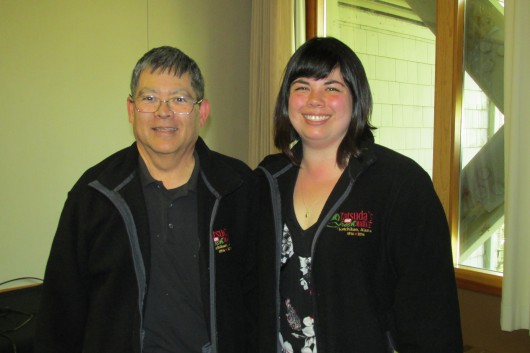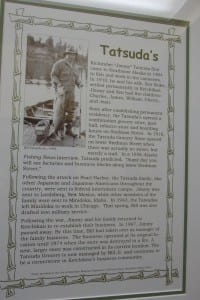Tatsuda’s grocery is celebrating its 100th anniversary in April. At Wednesday’s Chamber of Commerce lunch, Bill Tatsuda told the story of how the business began and was able to survive through hardships and changing times.
Sometimes emotional and often funny, Bill Tatsuda told how his family came to become grocers and stay in the business. His grandfather, Kichirobei “Jimmie” Tatsuda, arrived in the United States in 1904 at the age of 16 and worked in the salmon canning industry in Ketchikan. He decided to stay, and in 1914 sent home for a wife. A marriage was arranged and Sen Seike arrived in Ketchikan that year. Tatsuda says it was his grandmother who really started business.
“She had to walk a long way back into town to shop for groceries, and at some point she started buying extra milk, bread and eggs and selling it to her neighbors. That was how the Tatsuda family got into the grocery business – my grandmother just hauling stuff back and selling it to her neighbors.”
The family lived in what was then called Indian Town on Stedman Street. In 1916 they opened Jimmie’s Grocery at 415 Stedman Street. Bill Tatsuda says this was the only grocery store in town that allowed Native people to charge their purchases.
“Everyone bought their groceries on credit and they’d pay at the end of the month, at the end of the fishing season or when they could. They were the only store that allowed the Natives to charge and in return, they got all the business. They had loyal customers. They found out, obviously, that Natives pay their bills just as well as anyone else.”
He says the family was doing well until the bombing of Pearl Harbor on December 7, 1941.
“When the Japanese bombed Pearly Harbor, it was in fact “A Day of Infamy” for our country, the world, and particularly our family because, with the mass hysteria going on, everyone was afraid of Japanese. They were afraid of the Chinese, too. Anyone that looked Japanese. So they decided to relocate all these Japanese Americans to camps away from the coast. On very short notice, they had to close the store down, pack a couple of suitcases and were put on a boat. They ended up in Minidoka, Idaho.”
 Tatsuda says because they had to leave quickly and knew the store inventory would spoil, they gave the food away. He did not share much about the internment camp, other than to say it really was a prison surrounded by barbed wire.
Tatsuda says because they had to leave quickly and knew the store inventory would spoil, they gave the food away. He did not share much about the internment camp, other than to say it really was a prison surrounded by barbed wire.
Tatsuda says that during his family’s interment, the Inman family moved into the living quarters above the store and maintained the building. He says when the war ended and they moved back to Ketchikan in 1946, they had a place to come back to.
But, in January 1947 the store completely burned down. He says his father was blamed for the fire, but denied he started it.
“However, at the time the fire started, he was thawing pipes under the building with a torch. So, who knows.”
Tatsuda says years later he heard an eye-witness account from Boots Adams of Ketchikan who was in the store at the time of the fire.
“She was shopping in the store. My grandfather comes running out and says, ‘Get out of here!’” She though he was just mad at her for some reason. So finally she realizes there is a fire she runs out of the store. There’s a car parked in front of the store. She runs to the other side of the car just when the store blows up – there was a big explosion. She said the explosion singed the other side of the car and the car protected her.”
The family opened a new store at 339 Stedman, and in 1947 remained in that location until 1972 when another fire occurred. The building was saved, but all the merchandise was smoke damaged.
Rather than rebuild a small store at the same location, the family decided to open a full supermarket. They opened Tatsuda’s Supermarket in 1974 at 633 Stedman Street, its current location. It became part of the IGA independent grocers’ organization in 1993.
Tatsuda says the store survived over the years because of his grandparents’ dedication, strong work ethic and the legacy they passed on.
“They were always working. They worked while the store was open. They worked on the days the store was closed. They just did everything they possibly could to make ends meet and keep the business going.”
He says one of the biggest challenges was when Walmart arrived in Ketchikan in 2001. But, competitive prices and customer loyalty helped them through that challenge.
The Tatsudas have been named this year’s Grand Marshalls for the Fourth of July Parade, and the theme of the parade is “Hometown Proud,” which is also the slogan for IGA stores, such as Tatsuda’s.
On Saturday, April 23rd, Tatsuda’s celebrated its 100th anniversary with a ribbon-cutting ceremony for the newly remodeled building and a reveal of art work by Ketchikan artist Evon Zerbetz.









